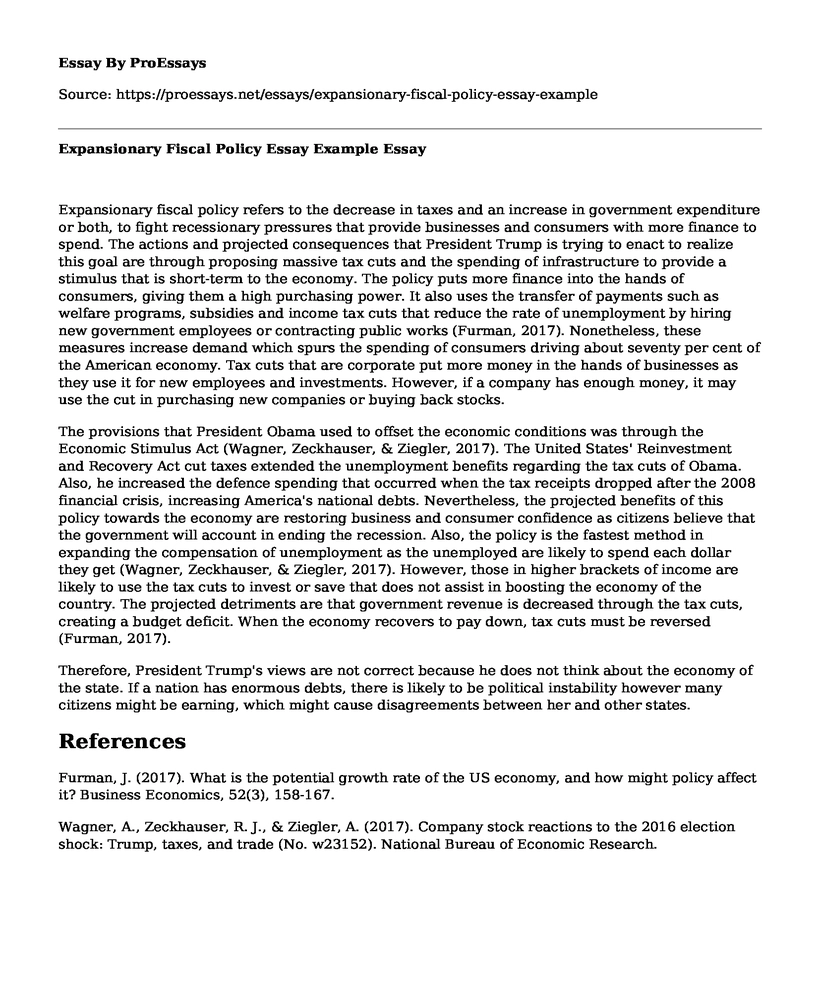Expansionary fiscal policy refers to the decrease in taxes and an increase in government expenditure or both, to fight recessionary pressures that provide businesses and consumers with more finance to spend. The actions and projected consequences that President Trump is trying to enact to realize this goal are through proposing massive tax cuts and the spending of infrastructure to provide a stimulus that is short-term to the economy. The policy puts more finance into the hands of consumers, giving them a high purchasing power. It also uses the transfer of payments such as welfare programs, subsidies and income tax cuts that reduce the rate of unemployment by hiring new government employees or contracting public works (Furman, 2017). Nonetheless, these measures increase demand which spurs the spending of consumers driving about seventy per cent of the American economy. Tax cuts that are corporate put more money in the hands of businesses as they use it for new employees and investments. However, if a company has enough money, it may use the cut in purchasing new companies or buying back stocks.
The provisions that President Obama used to offset the economic conditions was through the Economic Stimulus Act (Wagner, Zeckhauser, & Ziegler, 2017). The United States' Reinvestment and Recovery Act cut taxes extended the unemployment benefits regarding the tax cuts of Obama. Also, he increased the defence spending that occurred when the tax receipts dropped after the 2008 financial crisis, increasing America's national debts. Nevertheless, the projected benefits of this policy towards the economy are restoring business and consumer confidence as citizens believe that the government will account in ending the recession. Also, the policy is the fastest method in expanding the compensation of unemployment as the unemployed are likely to spend each dollar they get (Wagner, Zeckhauser, & Ziegler, 2017). However, those in higher brackets of income are likely to use the tax cuts to invest or save that does not assist in boosting the economy of the country. The projected detriments are that government revenue is decreased through the tax cuts, creating a budget deficit. When the economy recovers to pay down, tax cuts must be reversed (Furman, 2017).
Therefore, President Trump's views are not correct because he does not think about the economy of the state. If a nation has enormous debts, there is likely to be political instability however many citizens might be earning, which might cause disagreements between her and other states.
References
Furman, J. (2017). What is the potential growth rate of the US economy, and how might policy affect it? Business Economics, 52(3), 158-167.
Wagner, A., Zeckhauser, R. J., & Ziegler, A. (2017). Company stock reactions to the 2016 election shock: Trump, taxes, and trade (No. w23152). National Bureau of Economic Research.
Cite this page
Expansionary Fiscal Policy Essay Example. (2022, Aug 15). Retrieved from https://proessays.net/essays/expansionary-fiscal-policy-essay-example
If you are the original author of this essay and no longer wish to have it published on the ProEssays website, please click below to request its removal:
- Essay Example: Analysis of the Coca-Cola Advertisement that Addresses the Issue of Multiculturalism
- Impact of Tax on the Market Essay
- The Budgeting and Financial Planning Approach for A2 Milk Company
- Audit of Inventory, Warehousing and Payroll Accounts and Cycles of Starbucks Company - Research Paper
- Essay Example on Venezuela Crisis: Poor Governance, Black Market & Failing Economy
- Essay on Capital Replacement & Maintenance Budgets: Setting an Annual Plan
- Essay on Urban Governance: Examining Diffuse Authority & Unspoken Conventions







